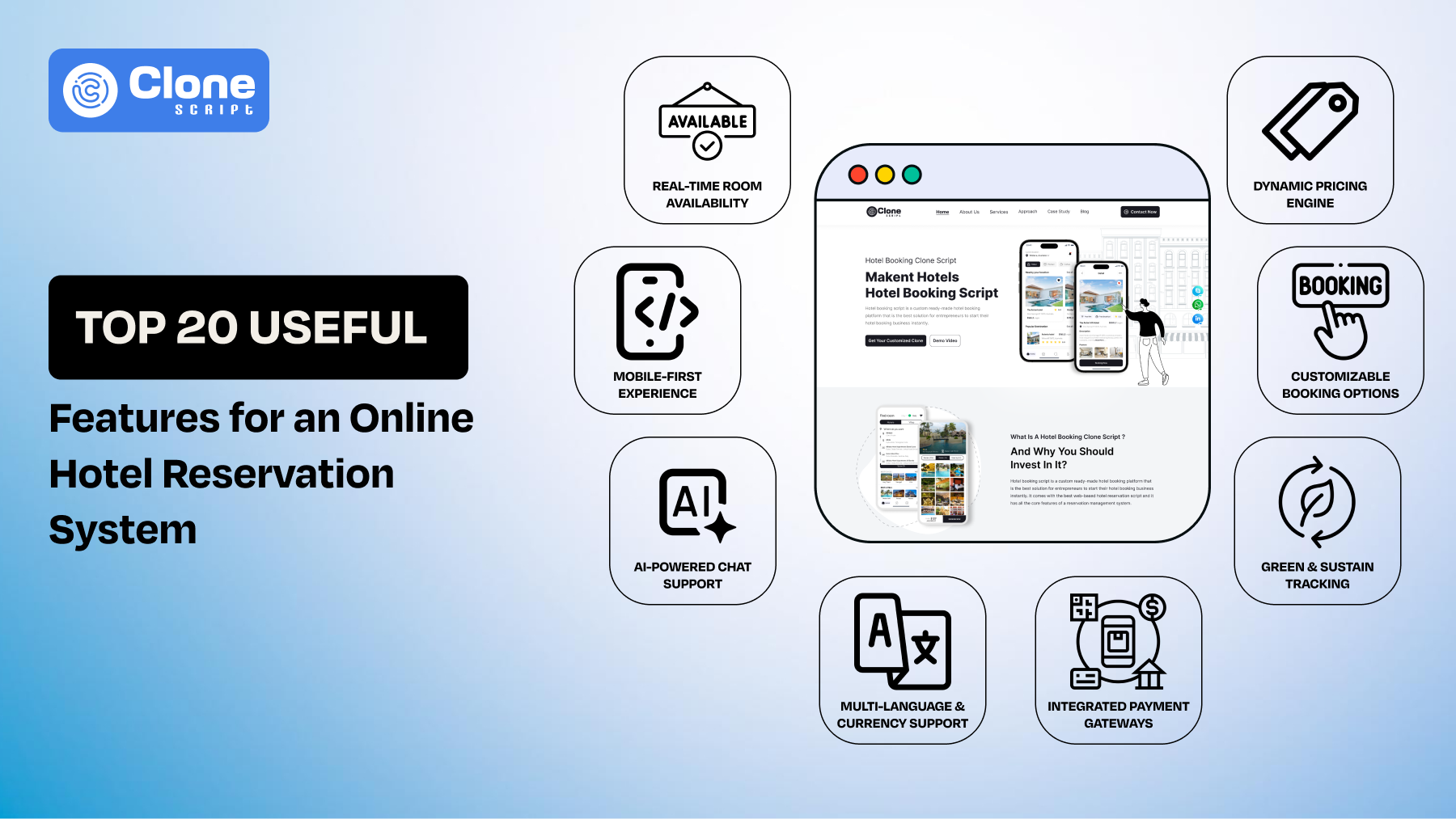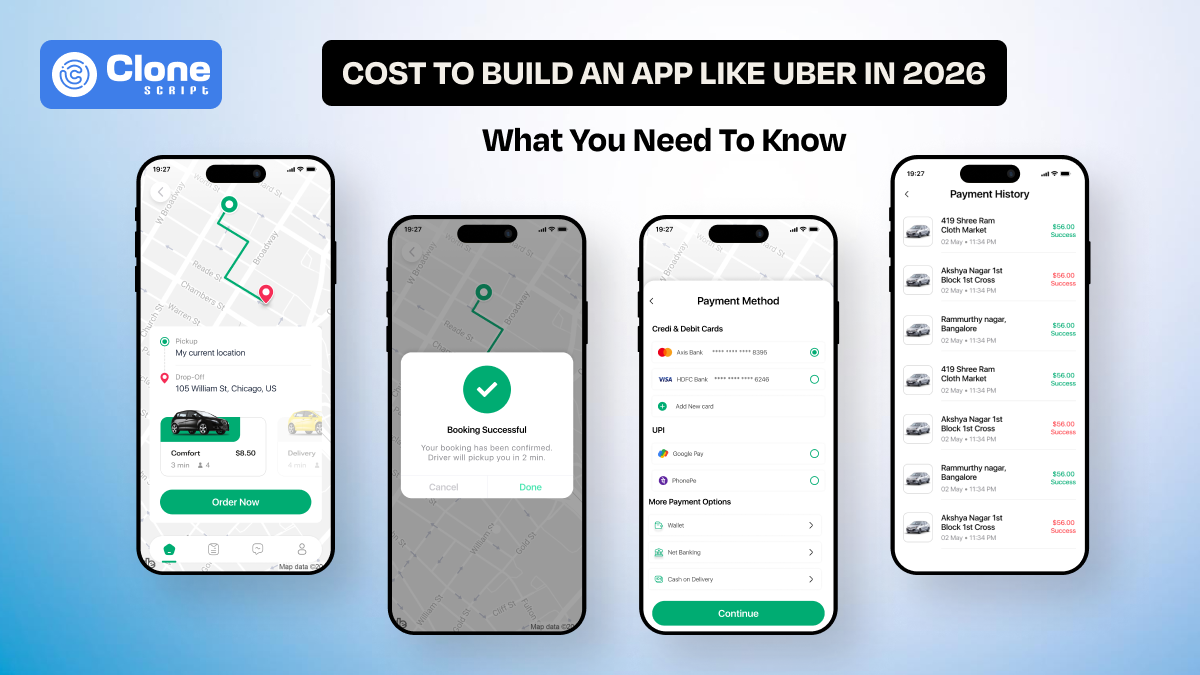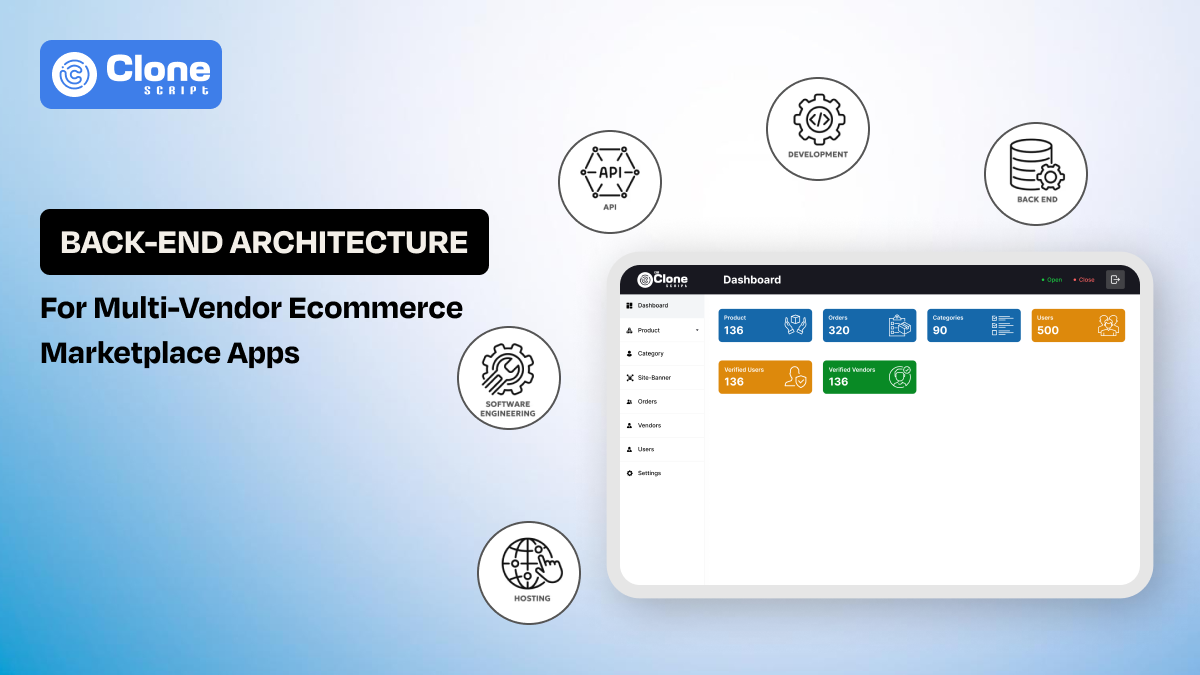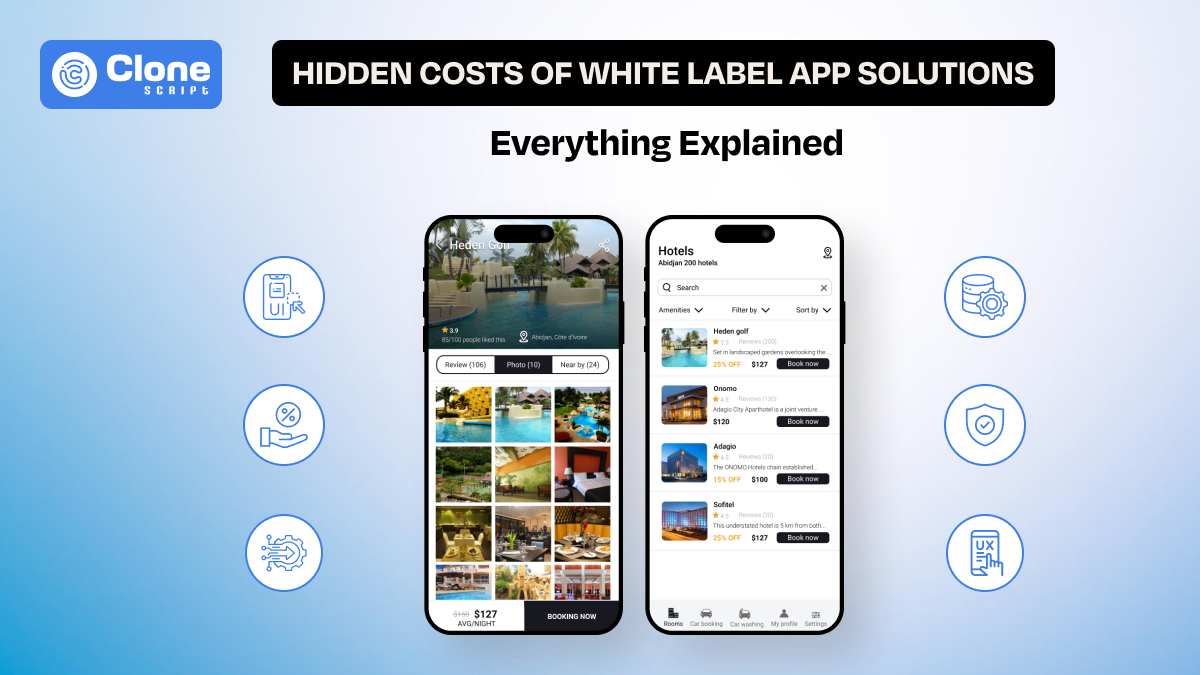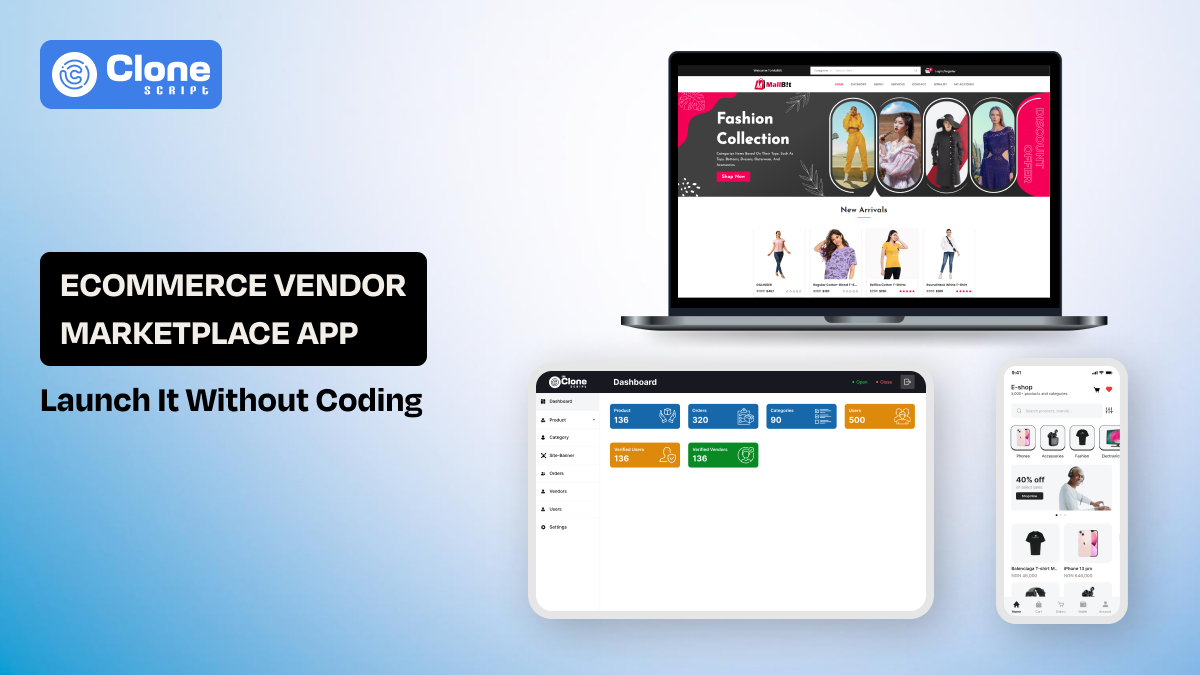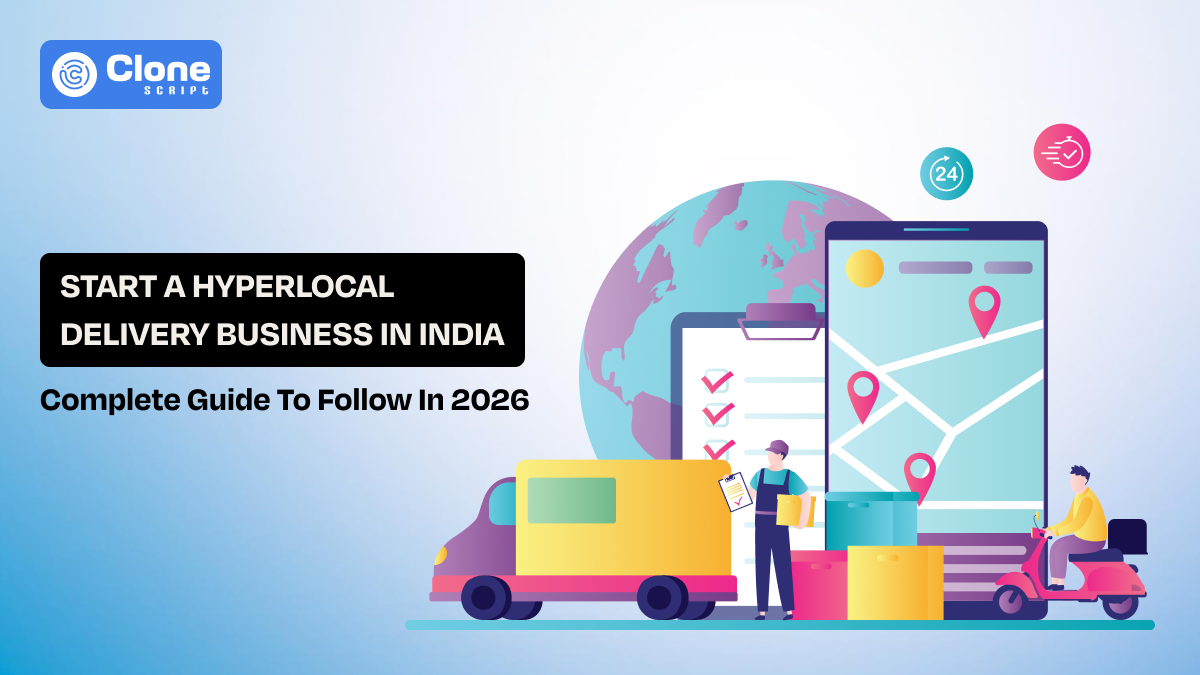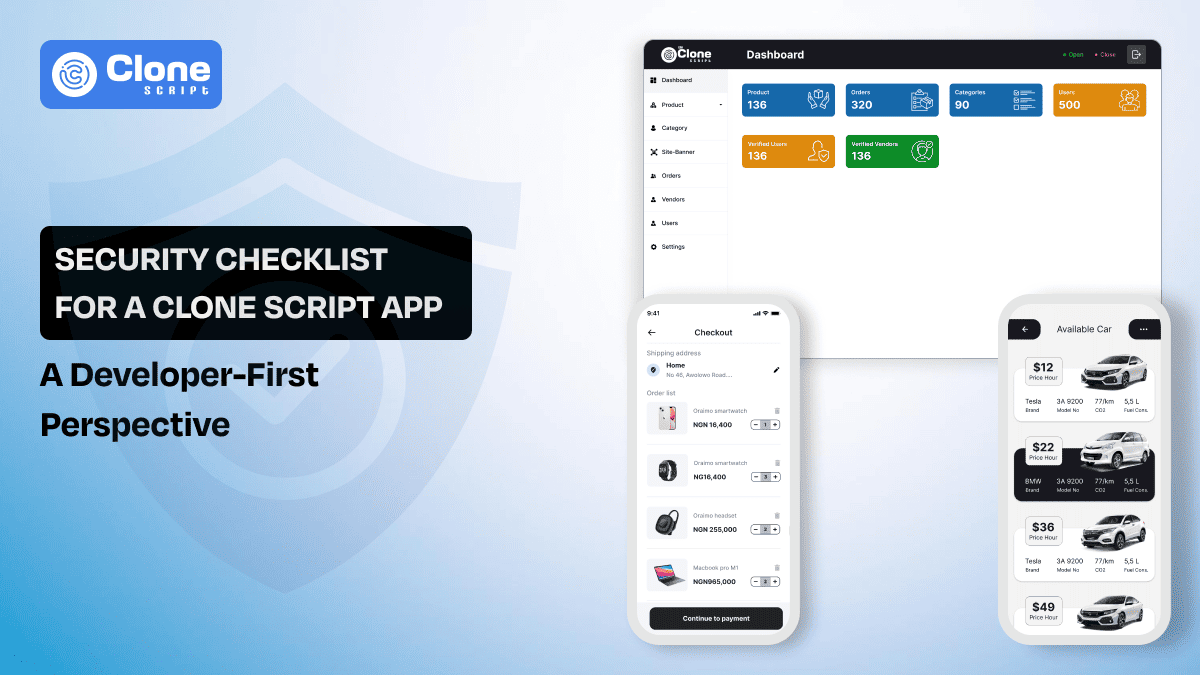Top 20 Useful and Latest Features for an Online Hotel Reservation System
The hotel industry is evolving rapidly. For modern hotel businesses, especially those in the US, India, and Europe, staying competitive means more than just offering comfortable rooms. It’s about delivering a flexible digital booking experience through reliable and feature-rich hotel reservation software.
Whether you’re a boutique hotel, a budget lodge, or a premium resort, implementing an advanced hotel booking software is the key to streamlining operations. It correlates to increasing direct bookings and enhancing guest satisfaction.
But before you opt for a software for room booking, you have to be familiar with the features it offers. Once you know the functionality, you can target the travelers and casual guests perfectly and get results such as high demand for bookings and stress-free service management.
Let’s dive into the top 20 latest and useful features that every hotel should look for in a smart hotel reservation booking system.
Online Hotel Reservation Booking Software Features List
Here is the complete list of key features:
-
Appealing Interface Design
-
Real-Time Room Availability
-
Mobile-First Experience
-
AI-Powered Chat Support
-
Multi-Language & Multi-Currency Support
-
Integrated Payment Gateways
-
Green & Sustainability Tracking
-
Customizable Booking Options
-
Dynamic Pricing Management
-
Centralized Dashboard
-
Channel Manager Integration
-
Built-in Review and Rating Tools
-
Automated Email & SMS Notifications
-
Loyalty and Rewards Programs
-
Interactive Calendar View
-
Contactless Check-In & Check-Out
-
Complete Guest Profile System
-
Promotions and Coupon Code Management
-
Powerful Analytics and Reports
-
Google Hotel Integration
Let’s understand these features in detail.
1. Appealing Interface Design
Your hotel's first impression comes from your booking interface. A clean, modern, and aesthetically pleasing UI design builds trust and encourages action.
-
A well-structured layout, intuitive navigation, attractive visuals, and smart use of branding can significantly enhance the user experience.
-
Whether on desktop or mobile, beautiful interfaces should guide users smoothly from browsing to booking.
Visual consistency and responsive design also help reduce bounce rates and increase conversions. It is essential for building brand credibility in a competitive digital environment.
2. Real-Time Room Availability
Accurate inventory is the backbone of any hotel reservation booking script. Real-time syncing check your platform immediately reflects every booking, cancellation, or no-show. This reflective update across your website, mobile app, and OTAs eliminates overbookings and miscommunications.
-
With clear visibility into which rooms are free or occupied, front-desk teams save hours of manual adjustments, and guests feel confident that what they see is what they get.
-
Integrations with channel managers further automate booking rates and availability updates on platforms like Booking.com or Expedia.
It preserves your reputation and improves conversion rates by reducing booking issues.
3. Mobile-First Experience
Today’s travelers live on their smartphones. A hotel reservation web application is optimized for mobile. It offers swift, thumb-friendly navigation, tap-to-select dates, and one-click payments using Apple Pay or Google Pay.
Here is what the software does:
-
Optimized a website speed and hotel booking mobile app for fast-loading pages, large call-to-action buttons, and simplified forms to cater to guests on the go. It lowers bounce rates and boosts bookings.
-
Moving towards the responsive UI and UX design of the booking system, it should be perfect and tested without any errors. In other words, whenever your website opens on the desktop, mobile, and tablet has to offer a flowing experience, not confusing.
Offline caching keeps important pages accessible even when connectivity dips. For example, a guest wants to book a luxury suite at your hotel, and he initiates the online payment, but the internet eventually disconnects, still, your system identifies it.
Thus, prioritizing mobile-first development demonstrates your brand’s commitment to convenience and usability. This can be helpful, especially for millennials and Gen Z, who prefer online travel bookings.
4. AI-Powered Chat Support
Integrating AI chatbots into your hotel booking software transforms customer service. These bots answer FAQs, guide users through room selection, and even upsell add-ons like breakfast or spa packages. AI in customer experience proves to be a key factor to hold the attention of competitors.
-
AI-driven learning improves responses over time by analyzing past interactions and making each conversation smoother.
-
Guests appreciate instant replies, whether it’s at midnight or across time zones. Meanwhile, your staff can focus on high-touch tasks instead of repetitive queries.
By reducing response times and enhancing user engagement, AI chatbots contribute to higher satisfaction rates and a more personalized booking journey.
5. Multi-Language & Multi-Currency Support
As tourism globalizes, a hotel reservation system must speak guests’ languages literally. Multilingual support offering different language interfaces (English, Hindi, French, Spanish) and supporting various currencies (USD, INR, EUR, GBP) removes barriers at checkout.
-
When travelers see prices in familiar money and read prompts in their native tongue, they’re more likely to complete their purchase. This also reduces customer support queries about rates and booking terms.
-
Localized payment options, UPI, Alipay, and SEPA further streamline transactions.
Such inclusivity widens your market reach and builds trust among international visitors. This results in high conversion and reduces cart abandonment.
6. Integrated Payment Gateways
A smooth, stress-free booking experience for your hotel guests is like a delicious sauce everyone wants to try. That's what modern software with integrated payment gateways delivers.
Offering different online payment options, from credit cards to popular digital wallets like PayPal and UPI, along with mobile choices. So, no one among the guests skipped your hotel to book a room just because secure online payment methods do not exist on the website and app.
-
Features like secure pre-authorization for deposits and flexible refunds or split payments for groups enhance guest satisfaction. Crucially, robust PCI DSS compliance safeguards sensitive data, building trust.
Real-time transaction tracking provides a clear financial overview, simplifying reconciliation and boosting transparency across your hotel operations. This leads to happier guests and a more efficient business.
7. Green & Sustainability Tracking
Eco-conscious travelers seek transparency. Green & Sustainability Tracking in your hotel reservation software monitors and reports your property’s environmental initiatives, energy usage, water conservation, waste management, and carbon footprint.
-
Guests can see eco-labels and opt for green rates or carbon offset options during booking.
-
Automated tracking generates sustainability reports for internal audits and marketing, showcasing your commitment to responsible tourism.
This feature not only appeals to environmentally aware guests but also helps you achieve green certifications and reduce operational costs. It aligns with global sustainability goals, enhancing your hotel’s reputation and marketability.
8. Customizable Booking Options
Every traveler is unique; your hotel booking mobile app and website should reflect that.
-
Customizable add-ons let guests tailor stays: from late check-out and early check-in to airport transfers, spa treatments, or special occasion packages. These configurable upsells appear seamlessly within the booking flow, increasing your average revenue per booking.
Behind the scenes, your dashboard logs these requests for operational teams to manage. Personalized packages also boost guest satisfaction by addressing individual needs. When travelers see options that match their desires, they’re more inclined to choose your hotel over competitors.
9. Dynamic Pricing Management
Maximizing revenue demands flexibility. A dynamic pricing feature uses AI and market data, local events, seasonality, and competitor rates to automatically adjust room prices in real time.
-
During high-demand periods like festivals or conferences, rates scale up; during slow seasons, they dip to attract budget-conscious travelers. This automated rate management eliminates manual guesswork and ensures optimal pricing strategies 24/7.
Integration with demand forecasting tools indicate to make smarter decisions and reveals trends for future planning. By balancing occupancy and profitability, dynamic pricing transforms your hotel room reservation system into a powerful revenue generator.
10. Centralized Dashboard Integration
Efficiency starts with visibility. A unified dashboard in your hotel booking software app represents bookings, payments, guest profiles, and analytics in one place. Color-coded calendars show occupancy at a glance, while alerts flag double bookings or pending payments.
-
Real-time revenue metrics track RevPAR (Revenue per Available Room) and average daily rates, helping you pivot strategies quickly. Permissions-based access lets team members view relevant data without clutter.
This one-stop control center reduces training time, prevents errors, and empowers small teams to manage entire properties effectively.
11. Channel Manager Integration
Maintaining a consistent inventory across platforms is crucial. A channel manager integrated into your hotel room reservation system automates availability, rate, and restriction updates on OTAs like Booking.com, Airbnb, and Expedia. It eliminates manual channel checks.
-
When a booking occurs on one platform, all others update instantly to prevent overbookings.
-
Two-way syncing and consolidated commission reporting simplify revenue management.
By broadening your distribution network safely, you boost occupancy rates without increasing the risk of double bookings or rate disparities.
12. Built-in Review and Rating Tools
Social proof drives decisions. With integrated review tools, your hotel booking application solicits feedback post-stay via email or SMS and displays ratings on your site. Aggregating reviews from TripAdvisor, Google, and internal surveys builds credibility.
-
You can respond directly to comments, showing prospective guests that you value feedback.
-
Highlighting top testimonials alongside room listings boosts trust and conversion on all social media channels.
Analytics reveal sentiment trends, cleanliness, service, and amenities guiding improvements. This feedback helps not only to enhance your online reputation but also encourages guests to return.
13. Automated Email & SMS Notifications
Automated workflows in your hotel booking management software app help to send personalized booking confirmations, payment reminders, pre-arrival tips, and post-checkout thank-you notes. For marketing purposes, it can be a good initiative for a business to talk directly with the customers.
-
Also, the custom software helps to segment lists, allowing targeted upsell messages. E.g., a spa offers for honeymooners.
-
Consistent communication nurtures guest relationships.
This becomes a communication channel when a user opens the app, the SMS notifications show them what they’re missing. A branded email template designs keep messaging cohesive and inspires action, like booking or contact.
Automating these touchpoints reduces staff workload and errors while maintaining professionalism and engagement throughout the guest journey.
14. Loyalty and Rewards Programs
A built-in loyalty module rewards guests for bookings, referrals, and social shares. Points accumulate toward discounts, room upgrades, or free nights.
-
Tiered programs like as silver, gold, and platinum unlock exclusive perks.
-
Guests receive personalized offers based on their stay history, tracked automatically by your hotel reservation software.
-
Gamification elements like progress trackers boost engagement.
-
Loyalty insights guide marketing strategies, helping you focus on high-value customers and nurture lifetime relationships.
15. Interactive Calendar View
Visual scheduling simplifies management. The interactive calendar in your hotel reservation booking system displays reservations, housekeeping schedules, and maintenance slots side by side.
-
Drag-and-drop functionality lets you adjust bookings or allocate rooms swiftly.
-
Color codes and icons highlight special requests, sea view, and an extra bed.
This ensures staff awareness. Integrations with external calendars (Google, Outlook) keep team members aligned. This visual tool reduces scheduling errors and improves operational coordination, especially for properties with multiple room types.
16. Contactless Check-In & Check-Out
Health and convenience converge with contactless processes. Your room booking app and website can send digital room keys via mobile apps or QR codes, allowing guests to bypass the front desk.
-
Pre-registration collects IDs and payment details securely online.
-
Automated triggers record arrivals and departures, updating housekeeping schedules.
-
Guests appreciate minimal wait times, while hotels reduce staffing pressures.
This modern approach caters to business travelers and safety-conscious guests, enhancing satisfaction across demographics.
17. Comprehensive Guest Profile System
Personalization starts with data. Your room reservation app should capture guest details, preferences, special requests, stay history, and feedback in a secure CRM-like module.
-
When a repeat guest books, your system auto-populates known preferences, room type, pillow choice, and dietary needs. This provides a tailored experience.
-
Marketing campaigns use these insights for targeted promotions.
By treating guests as individuals, you encourage loyalty and positive reviews, turning one-time visitors into brand advocates.
18. Promotions and Coupon Code Management
Whenever you need to fill rooms during off-peak periods, launch last-minute deals, or partner with influencers, your hotel booking app should offer flexible promo and coupon code creation.
-
Track redemptions and analyze which campaigns yield the highest ROI.
-
Time-bound codes, percentage discounts, and fixed-amount offers can be A/B tested.
This complete control over promotions empowers marketing teams to drive targeted traffic and maximize occupancy without eroding profit margins.
19. Powerful Analytics and Reports
Data-driven decisions shape success. Built-in analytics within your hotel reservation website monitor metrics like RevPAR, ADR (Average Daily Rate), and occupancy trends.
-
Customizable dashboards visualize booking sources, length-of-stay patterns, and guest demographics.
-
Scheduled reports deliver insights to stakeholders automatically.
-
Drill-down capabilities reveal important data like as room performance, channel profitability, guiding rate strategies, staffing plans, and marketing investments.
With these insights, you can quickly optimize revenue and operations.
20. Google Hotel Integration
Enhance your direct booking channel by integrating with Google Hotel Ads. Real-time availability and dynamic pricing feed into Google’s travel search, displaying your best rates to users searching specific locations or dates.
-
Guests click through directly to your booking engine, bypassing OTAs and saving on commission fees.
-
The integration syncs seamlessly with your hotel booking software, ensuring accurate inventory and transparent pricing, while analytics track which queries drive bookings for continuous optimization.
It guides your business to perform well and remain on track in the competition.
Ready to Upgrade Your Hotel Booking System?
Implementing a future-ready hotel booking software can significantly improve how you manage operations, attract guests, and scale your business.
At All Clone Script, we design powerful and scalable hotel reservation system software that supports:
-
AI-driven booking flows
-
Mobile-first UI/UX
-
Real-time analytics and guest insights
-
API integrations and multi-language support
Whether you’re starting or looking to expand, our systems are tailored for businesses across India, the US, and Europe.
Contact All Clone Script today to elevate your guest experience and operational efficiency with the best hotel booking mobile app and website solutions available.
FAQs
-
What is the best hotel reservation system for small hotels in 2025?
The top choice is a cloud-based hotel booking software with mobile responsiveness, real-time syncing, and user-friendly dashboards. These solutions offer scalability, security, and continuous updates to support modern hoteliers.
-
How can hotel booking management software grow my hotel business?
By automating routine tasks, enhancing guest experiences, and providing analytics-driven insights, hotel reservation software increases direct bookings, improves operational efficiency, and boosts guest loyalty.
-
Can I customize the hotel reservation features for my property size or type?
Yes. Leading software hotel reservation platforms offer modular feature sets, letting you pick the tools. Channel manager, loyalty modules, analytics that fit everything from single-room B&Bs to multi-site resorts.
-
Is my guest data secure?
Reputable hotel reservation software platforms comply with industry standards like PCI DSS and GDPR. They use encryption, role-based access controls, and secure backups to protect sensitive guest information.
-
How can I measure the ROI of my reservation software?
Track metrics such as direct booking increase, average booking value, RevPAR, and reduced OTA commissions. Compare these against subscription or licensing costs to calculate your return on investment. Regular reporting and analytics help you fine-tune strategies.
 BTC - Bitcoin
BTC - Bitcoin
 USDTERC20 - USDT ERC20
USDTERC20 - USDT ERC20
 ETH - Ethereum
ETH - Ethereum
 BNB - Binance
BNB - Binance
 BCH - Bitcoin Cash
BCH - Bitcoin Cash
 DOGE - Dogecoin
DOGE - Dogecoin
 TRX - TRON
TRX - TRON
 USDTTRC20 - USD TRC20
USDTTRC20 - USD TRC20
 LTC - LiteCoin
LTC - LiteCoin

